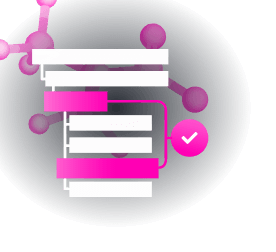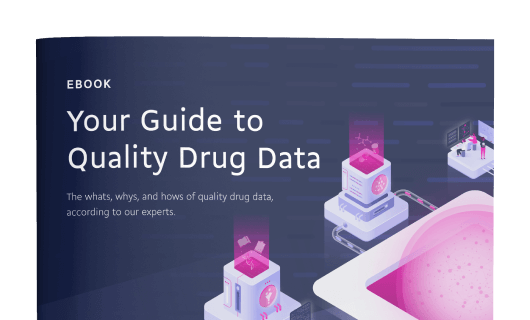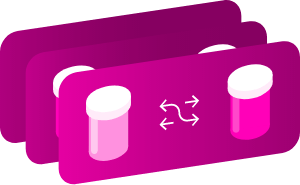Identification
- Generic Name
- Fontolizumab
- DrugBank Accession Number
- DB05111
- Background
Fontolizumab (marketed under the trade name HuZAF™) is a humanized monoclonal antibody which is used as an immunosuppressive drug to treat Crohn's disease.
- Type
- Biotech
- Groups
- Investigational
- Biologic Classification
- Protein Based Therapies
Monoclonal antibody (mAb) - Protein Structure

- Protein Chemical Formula
- Not Available
- Protein Average Weight
- Not Available
- Sequences
- Not Available
- Synonyms
- Fontolizumab
Pharmacology
- Indication
Investigated for use/treatment in crohn's disease and psoriasis and psoriatic disorders.
 Reduce drug development failure ratesBuild, train, & validate machine-learning modelswith evidence-based and structured datasets.Build, train, & validate predictive machine-learning models with structured datasets.
Reduce drug development failure ratesBuild, train, & validate machine-learning modelswith evidence-based and structured datasets.Build, train, & validate predictive machine-learning models with structured datasets.- Contraindications & Blackbox Warnings
 Prevent Adverse Drug Events TodayTap into our Clinical API for life-saving information on contraindications & blackbox warnings, population restrictions, harmful risks, & more.Avoid life-threatening adverse drug events with our Clinical API
Prevent Adverse Drug Events TodayTap into our Clinical API for life-saving information on contraindications & blackbox warnings, population restrictions, harmful risks, & more.Avoid life-threatening adverse drug events with our Clinical API- Pharmacodynamics
Not Available
- Mechanism of action
Fontolizumab is a humanised antibody directed against recombinant human IFN-{gamma}. The antibody binds to natural human IFN-{gamma} and inhibits expression of IFN-{gamma} regulated genes known to be upregulated in Crohn’s disease.
Target Actions Organism UInterferon gamma Not Available Humans - Absorption
Not Available
- Volume of distribution
Not Available
- Protein binding
Not Available
- Metabolism
- Not Available
- Route of elimination
Not Available
- Half-life
Not Available
- Clearance
Not Available
- Adverse Effects
 Improve decision support & research outcomesWith structured adverse effects data, including: blackbox warnings, adverse reactions, warning & precautions, & incidence rates. View sample adverse effects data in our new Data Library!Improve decision support & research outcomes with our structured adverse effects data.
Improve decision support & research outcomesWith structured adverse effects data, including: blackbox warnings, adverse reactions, warning & precautions, & incidence rates. View sample adverse effects data in our new Data Library!Improve decision support & research outcomes with our structured adverse effects data.- Toxicity
Not Available
- Pathways
- Not Available
- Pharmacogenomic Effects/ADRs
- Not Available
Interactions
- Drug Interactions
- This information should not be interpreted without the help of a healthcare provider. If you believe you are experiencing an interaction, contact a healthcare provider immediately. The absence of an interaction does not necessarily mean no interactions exist.
Drug Interaction Integrate drug-drug
interactions in your softwareAbciximab The risk or severity of adverse effects can be increased when Abciximab is combined with Fontolizumab. Adalimumab The risk or severity of adverse effects can be increased when Adalimumab is combined with Fontolizumab. Aducanumab The risk or severity of adverse effects can be increased when Fontolizumab is combined with Aducanumab. Alemtuzumab The risk or severity of adverse effects can be increased when Alemtuzumab is combined with Fontolizumab. Alirocumab The risk or severity of adverse effects can be increased when Fontolizumab is combined with Alirocumab. - Food Interactions
- Not Available
Products
 Drug product information from 10+ global regionsOur datasets provide approved product information including:dosage, form, labeller, route of administration, and marketing period.Access drug product information from over 10 global regions.
Drug product information from 10+ global regionsOur datasets provide approved product information including:dosage, form, labeller, route of administration, and marketing period.Access drug product information from over 10 global regions.- International/Other Brands
- HuZAF
Categories
- Drug Categories
- Chemical TaxonomyProvided by Classyfire
- Description
- Not Available
- Kingdom
- Organic Compounds
- Super Class
- Organic Acids
- Class
- Carboxylic Acids and Derivatives
- Sub Class
- Amino Acids, Peptides, and Analogues
- Direct Parent
- Peptides
- Alternative Parents
- Not Available
- Substituents
- Not Available
- Molecular Framework
- Not Available
- External Descriptors
- Not Available
- Affected organisms
- Not Available
Chemical Identifiers
- UNII
- 6J92H2439Z
- CAS number
- 326859-36-3
References
- General References
- Hommes DW, Mikhajlova TL, Stoinov S, Stimac D, Vucelic B, Lonovics J, Zakuciova M, D'Haens G, Van Assche G, Ba S, Lee S, Pearce T: Fontolizumab, a humanised anti-interferon gamma antibody, demonstrates safety and clinical activity in patients with moderate to severe Crohn's disease. Gut. 2006 Aug;55(8):1131-7. Epub 2006 Feb 28. [Article]
- Reinisch W, Hommes DW, Van Assche G, Colombel JF, Gendre JP, Oldenburg B, Teml A, Geboes K, Ding H, Zhang L, Tang M, Cheng M, van Deventer SJ, Rutgeerts P, Pearce T: A dose escalating, placebo controlled, double blind, single dose and multidose, safety and tolerability study of fontolizumab, a humanised anti-interferon gamma antibody, in patients with moderate to severe Crohn's disease. Gut. 2006 Aug;55(8):1138-44. Epub 2006 Feb 21. [Article]
- Dumont FJ: Fontolizumab Protein Design Labs. Curr Opin Investig Drugs. 2005 May;6(5):537-44. [Article]
- External Links
- PubChem Substance
- 347909951
- Wikipedia
- Fontolizumab
Clinical Trials
- Clinical Trials
Phase Status Purpose Conditions Count 2 Terminated Treatment Rheumatoid Arthritis 1
Pharmacoeconomics
- Manufacturers
- Not Available
- Packagers
- Not Available
- Dosage Forms
- Not Available
- Prices
- Not Available
- Patents
- Not Available
Properties
- State
- Solid
- Experimental Properties
- Not Available
Targets

Build, predict & validate machine-learning models
Use our structured and evidence-based datasets to unlock newinsights and accelerate drug research.
Use our structured and evidence-based datasets to unlock new insights and accelerate drug research.
- Kind
- Protein
- Organism
- Humans
- Pharmacological action
- Unknown
- General Function
- Interferon-gamma receptor binding
- Specific Function
- Produced by lymphocytes activated by specific antigens or mitogens. IFN-gamma, in addition to having antiviral activity, has important immunoregulatory functions. It is a potent activator of macrop...
- Gene Name
- IFNG
- Uniprot ID
- P01579
- Uniprot Name
- Interferon gamma
- Molecular Weight
- 19348.165 Da
Drug created at October 21, 2007 22:23 / Updated at February 21, 2021 18:51


